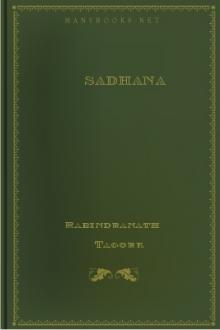Sadhana - Rabindranath Tagore (book club suggestions txt) 📗

- Author: Rabindranath Tagore
- Performer: -
Book online «Sadhana - Rabindranath Tagore (book club suggestions txt) 📗». Author Rabindranath Tagore
The Project Gutenberg EBook of Sadhana, by Rabindranath Tagore #10 in our series by Rabindranath Tagore Copyright laws are changing all over the world. Be sure to check the copyright laws for your country before downloading or redistributing this or any other Project Gutenberg eBook.
This header should be the first thing seen when viewing this Project Gutenberg file. Please do not remove it. Do not change or edit the header without written permission.
Please read the “legal small print,” and other information about the eBook and Project Gutenberg at the bottom of this file. Included is important information about your specific rights and restrictions in how the file may be used. You can also find out about how to make a donation to Project Gutenberg, and how to get involved.
**Welcome To The World of Free Plain Vanilla Electronic Texts**
**eBooks Readable By Both Humans and By Computers, Since 1971**
*****These eBooks Were Prepared By Thousands of Volunteers!*****
Title: Sadhana
The Realisation of Life
Author: Rabindranath Tagore
Release Date: November, 2004 [EBook #6842]
[Yes, we are more than one year ahead of schedule]
[This file was first posted on January 31, 2003]
Edition: 10
Language: English
Character set encoding: ASCII
*** START OF THE PROJECT GUTENBERG EBOOK SADHANA ***
This eBook was produced by Chetan Jain at BharatLiterature.
SADHANA THE REALISATION OF LIFEBy
Rabindranath Tagore
Author of ‘Gitanjali’
1916
To
Ernest Rhys
Author’s Preface
Perhaps it is well for me to explain that the subject-matter of the papers published in this book has not been philosophically treated, nor has it been approached from the scholar’s point of view. The writer has been brought up in a family where texts of the Upanishads are used in daily worship; and he has had before him the example of his father, who lived his long life in the closest communion with God, while not neglecting his duties to the world, or allowing his keen interest in all human affairs to suffer any abatement. So in these papers, it may be hoped, western readers will have an opportunity of coming into touch with the ancient spirit of India as revealed in our sacred texts and manifested in the life of to-day.
All the great utterances of man have to be judged not by the letter but by the spirit—the spirit which unfolds itself with the growth of life in history. We get to know the real meaning of Christianity by observing its living aspect at the present moment—however different that may be, even in important respects, from the Christianity of earlier periods.
For western scholars the great religious scriptures of India seem to possess merely a retrospective and archaelogical interest; but to us they are of living importance, and we cannot help thinking that they lose their significance when exhibited in labelled cases—mummied specimens of human thought and aspiration, preserved for all time in the wrappings of erudition.
The meaning of the living words that come out of the experiences of great hearts can never be exhausted by any one system of logical interpretation. They have to be endlessly explained by the commentaries of individual lives, and they gain an added mystery in each new revelation. To me the verses of the Upanishads and the teachings of Buddha have ever been things of the spirit, and therefore endowed with boundless vital growth; and I have used them, both in my own life and in my preaching, as being instinct with individual meaning for me, as for others, and awaiting for their confirmation, my own special testimony, which must have its value because of its individuality.
I should add perhaps that these papers embody in a connected form, suited to this publication, ideas which have been culled from several of the Bengali discourses which I am in the habit of giving to my students in my school at Bolpur in Bengal; and I have used here and there translations of passages from these done by my friends, Babu Satish Chandra Roy and Babu Ajit Kumar Chakravarti. The last paper of this series, “Realisation in Action,” has been translated from my Bengali discourse on “Karma-yoga” by my nephew, Babu Surendra Nath Tagore.
I take this opportunity of expressing my gratitude to Professor James H. Woods, of Harvard University, for his generous appreciation which encouraged me to complete this series of papers and read most of them before the Harvard University. And I offer my thanks to Mr. Ernest Rhys for his kindness in helping me with suggestions and revisions, and in going through the proofs.
A word may be added about the pronouncing of Sadhana: the accent falls decisively on the first a, which has the broad sound of the letter.
CONTENTS I. THE RELATION OF THE INDIVIDUAL TO THE UNIVERSEII. SOUL CONSCIOUSNESS
III. THE PROBLEM OF EVIL
IV. THE PROBLEM OF SELF
V. REALISATION IN LOVE
VI. REALISATION IN ACTION
VII. THE REALISATION OF BEAUTY
VIII. THE REALISATION OF THE INFINITE
I THE RELATION OF THE INDIVIDUAL TO THE UNIVERSEThe civilisation of ancient Greece was nurtured within city walls. In fact, all the modern civilisations have their cradles of brick and mortar.
These walls leave their mark deep in the minds of men. They set up a principle of “divide and rule” in our mental outlook, which begets in us a habit of securing all our conquests by fortifying them and separating them from one another. We divide nation and nation, knowledge and knowledge, man and nature. It breeds in us a strong suspicion of whatever is beyond the barriers we have built, and everything has to fight hard for its entrance into our recognition.
When the first Aryan invaders appeared in India it was a vast land of forests, and the new-comers rapidly took advantage of them. These forests afforded them shelter from the fierce heat of the sun and the ravages of tropical storms, pastures for cattle, fuel for sacrificial fire, and materials for building cottages. And the different Aryan clans with their patriarchal heads settled in the different forest tracts which had some special advantage of natural protection, and food and water in plenty.
Thus in India it was in the forests that our civilisation had its birth, and it took a distinct character from this origin and environment. It was surrounded by the vast life of nature, was fed and clothed by her, and had the closest and most constant intercourse with her varying aspects.
Such a life, it may be thought, tends to have the effect of dulling human intelligence and dwarfing the incentives to progress by lowering the standards of existence. But in ancient India we find that the circumstances of forest life did not overcome man’s mind, and did not enfeeble the current of his energies, but only gave to it a particular direction. Having been in constant contact with the living growth of nature, his mind was free from the desire to extend his dominion by erecting boundary walls around his acquisitions. His aim was not to acquire but to realise, to enlarge his consciousness by growing with and growing into his surroundings. He felt that truth is all-comprehensive, that there is no such thing as absolute isolation in existence, and the only way of attaining truth is through the interpenetration of our being into all objects. To realise this great harmony between man’s spirit and the spirit of the world was the endeavour of the forest-dwelling sages of ancient India.
In later days there came a time when these primeval forests gave way to cultivated fields, and wealthy cities sprang up on all sides. Mighty kingdoms were established, which had communications with all the great powers of the world. But even in the heyday of its material prosperity the heart of India ever looked back with adoration upon the early ideal of strenuous self-realisation, and the dignity of the simple life of the forest hermitage, and drew its best inspiration from the wisdom stored there.
The west seems to take a pride in thinking that it is subduing nature; as if we are living in a hostile world where we have to wrest everything we want from an unwilling and alien arrangement of things. This sentiment is the product of the city-wall habit and training of mind. For in the city life man naturally directs the concentrated light of his mental vision upon his own life and works, and this creates an artificial dissociation between himself and the Universal Nature within whose bosom he lies.
But in India the point of view was different; it included the world with the man as one great truth. India put all her emphasis on the harmony that exists between the individual and the universal. She felt we could have no communication whatever with our surroundings if they were absolutely foreign to us.
Man’s complaint against nature is that he has to acquire most of his necessaries by his own efforts. Yes, but his efforts are not in vain; he is reaping success every day, and that shows there is a rational connection between him and nature, for we never can make anything our own except that which is truly related to us.
We can look upon a road from two different points of view. One regards it as dividing us from the object of our desire; in that case we count every step of our journey over it as something attained by force in the face of obstruction. The other sees it as the road which leads us to our destination; and as such it is part of our goal. It is already the beginning of our attainment, and by journeying over it we can only gain that which in itself it offers to us. This last point of view is that of India with regard to nature. For her, the great fact is that we are in harmony with nature; that man can think because his thoughts are in harmony with things; that he can use the forces of nature for his own purpose only because his power is in harmony with the power which is universal, and that in the long run his purpose never can knock against the purpose which works through nature.
In the west the prevalent feeling is that nature belongs exclusively to inanimate things and to beasts, that there is a sudden unaccountable break where human-nature begins. According to it, everything that is low in the scale of beings is merely nature, and whatever has the stamp of perfection on it, intellectual or moral, is human-nature. It is like dividing the bud and the blossom into two separate categories, and putting their grace to the credit of two different and antithetical principles. But the Indian mind never has any hesitation in acknowledging its kinship with nature, its unbroken relation with all.
The fundamental unity of creation was not simply a philosophical speculation for India; it was her life-object to realise this great harmony in feeling and in action. With mediation and service, with a regulation of life, she cultivated her consciousness in such a way that everything had a spiritual meaning to her. The earth, water and light, fruits and flowers, to her were not merely physical phenomena to be turned to use and then left aside. They were necessary to her in the attainment of her ideal of





Comments (0)